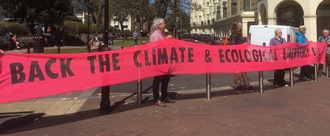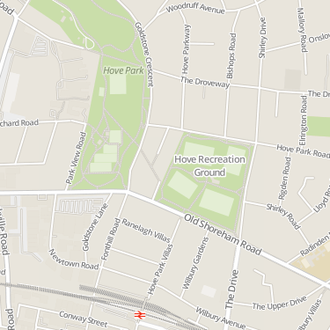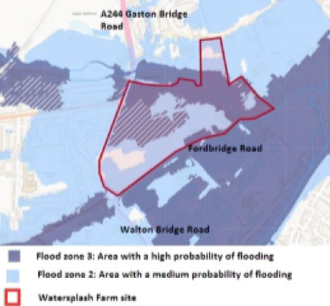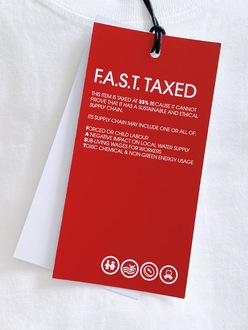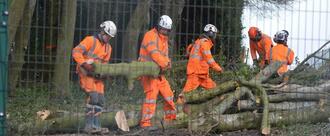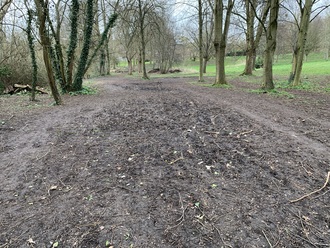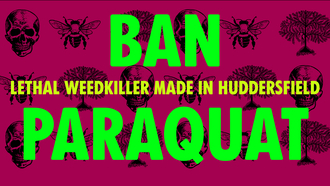-
Ask Worthing Council to back new climate & nature lawIt’s been 2 years since the UK declared a climate and environment emergency. The government says it is making progress towards reducing carbon emissions, but without more significant and sustained action from the richest countries, the world is set to exceed the Paris Agreement’s critical 1.5°C limit between 2030 and 2040. And the UK is one of the most nature-depleted countries in Europe. The costs of failing to address these crises will far outstrip the investments required to prevent it. Investing now will bring many benefits in the form of good jobs, breathable cities and thriving communities. Limiting heating to 1.5°C may still be possible with ambitious action from national and sub-national authorities, civil society, the private sector and local communities. Worthing Borough Council has declared a Climate Emergency and it is playing an important role in the UK taking action to achieve net zero. We want it to support the CEE Bill because all their efforts will not be enough unless there is new ambitious and effective national legislation. The CEE Bill (published as the “Climate and Ecology Bill”) binds the Government to develop an emergency strategy that: - requires that the UK plays its fair and proper role in reducing greenhouse gas emissions consistent with limiting global temperature increase to 1.5 degrees C above pre-industrial temperatures; - ensures that all the UK’s consumption emissions are accounted for; - includes emissions from aviation and shipping; - protects and restores biodiverse habitats along overseas supply chains; - restores and regenerates the UK’s depleted soils, wildlife habitats and species populations to healthy and robust states, maximising their capacity to absorb CO2 and their resistance to climate heating; - sets up an independent Citizens’ Assembly, representative of the UK’s population, to engage with Parliament and Government and help develop the emergency strategy. We want the Council to resolve to: - Support the Climate and Ecological Emergency Bill - Inform the local media of this decision; - Write to local MPs, asking them to support or thanking them for supporting the Bill; and - Write to the CEE Bill Alliance, the organisers of the campaign for the Bill, expressing its support ([email protected]). You can read more about the CEE Bill here: https://www.ceebill.uk238 of 300 SignaturesCreated by Claire Hunt
-
Install trams in Bristol, Bath & other UK cities to cut congestion, pollution and for regenerationWhy is this important? Small and large cities throughout the UK are being choked both environmentally and economically by car traffic. The only ones that have reversed this trend are those that have installed trams - Birmingham, Croydon, Edinburgh, Manchester, Newcastle, Nottingham, Sheffield, and the Docklands Light Railway. Find out more about how buses and trams together cut congestion, pollution, emissions and revitalize cities - whereas buses on their own never have: https://tinyurl.com/54z4eeud. Bath and Bristol Area Trams Association - BABATA - website: https://bathtrams.uk/ contains well referenced research which demonstrates the truth of all our statements, and which apply to almost any crowded British City. Note: we are a friendly social group with regular meetings - please - join us as there are many small fun tasks that need doing to make this happen - could be writing a letter to the paper, or the WECA mayor, proofreading a letter or leaflet, keeping a Facebook post up to date, booking a social get together, or simply posting on social media, etc. email us on [email protected] if you want to attend our regular Thursday fun meetings up stairs in a Bath Pub. Our task is twofold: 1. to convince the West of England Combined Authority, WECA, Mayor which has the authority and ability to access the necessary capital. (And to assist other appropriate authorities in other non-tram cities) (We understand very well the bureaucracy and politics that have to be negotiated to improve all transport, not just trams in our area). Thus, we are pushing for the WECA mayor to take his ITA - Integrated Traffic Authority Powers as have e.g., Birmingham Manchester etc. which powers they have used to install their splendid tram systems. 2. To inform the inhabitants and national and local politicians of Bath, Bristol, Radstock and other areas nationally of the credible, proven reasons why trams must be reinstalled in all our cities allied with planning policies to locate all new buildings - offices and housing along tram lines; Trams in town centres (but integrated with buses for peripheral and rural areas) work because enough previous car drivers will use the tram so it is not stalled by the previous car traffic. The reasons for this are: People like the fact they are not crammed together staring at the back of someone’s head. Children etc. are not trapped next to strangers due to bench seating on a tram and can easily move around. Ultra-rapid boarding and de-boarding - through multiple large doors, not possible on buses Trams inherently are able to operate more frequently than buses for unalterable technical and economic reasons. Are ultra-reliable. Faster through traffic, in even through crowded narrow streets due to Green Wave Traffic Light Prioritization https://bathtrams.uk/green-wave-traffic-light-pre-emption-work-tram-coming-bathford-via-batheaston/ ( not generally applicable to buses). Two tram cross town trips are acceptable, due to the low wait between connections and the reliability. This means parents will trust their children to trams. Also: Overall fare costs are cheaper than buses. Have about 1/3 the lifecycle energy consumption of buses due to much lower rubber tire friction. Have zero emissions, i.e. no toxic tyre dust due to steel wheels Do not need separate segregated routes, i.e. share exact same road as cars. And: Trams can negotiate all the narrow streets and steep hills in Bath There are systems which avoid having overhead wires Bath is certainly not too small for trams - there are many cities much much smaller than Bath with trams, and we are talking about connections to Keynsham, Bristol and Radstock. https://bathtrams.uk/cities-with-small-population-tram-systems/ Bath And Bristol Area Trams Association meet every 2nd Thursday 2. Email [email protected] for details. We have 3 tram supporters lists you may wish to join: 1. for members, absolutely no spam, just one monthly mail / newsletter to advise of meetings and events. 2. Local Bath and Bristol tram supporters - lots of chat about the issues pertaining to Bath and Bristol. Can be set to every email, or periodic summary. 3. National list for technical experts, those who want technical chat, or to know about national campaigning (we work closely with the national LRTA the Light Rail Transit Association https://www.lrta.org/). Can be set to every email, or periodic summary. 4. Very infrequent about 4 times a year list. Email [email protected] advising of any lists you would like to be on.1,617 of 2,000 SignaturesCreated by Dave Andrews
-
Increase Pedestrian Safety on Shirley DriveThere have been numerous collisions along Shirley Drive in recent years and it is indefensible that Brighton and Hove council refuse to install a pedestrian crossing anywhere along this road. There are four primary schools and two secondary schools close by, as well as all the foot traffic going to and from Hove Park and Hove Rec. This means there's nowhere safe to cross for a large number of school children, young families, the elderly and disabled - who all have to try and navigate a 30mph road with no crossing. The speed limit should also be reduced to 20mph to increase safety and reduce noise pollution. From the seafront up to the start of Hove Rec there are eight pedestrian crossings and a 20 mph limit. I do not understand why Shirley Drive is exempt from these safety measures when it is an extension of the same road. Please sign and help make our environment safer for the whole community.576 of 600 SignaturesCreated by Polly Wrenn
-
Boston Manor Park: Let's Build it Back better - and Greener!Boston Manor Park in West London was recently fortunate enough to receive £3.6m from the National Lottery Heritage Fund and National Lottery Community Fund to improve access, ecology and facilities at Boston Manor Park. Unfortunately, following a limited initial consultation, poor communication and flawed management the park looks like it’s been swept by a cyclone. Over 100 mature trees have been felled, hedgerows removed, and wildlife habitats destroyed. Local residents and visitors to the park alike have expressed their considerable upset and confusion over the damage done.285 of 300 SignaturesCreated by Jim Conroy
-
Immediately Pause Gravel Extraction at Watersplash Farm, SheppertonThe Watersplash Farm area is at high risk of flooding due to climate change and no 3-D modelling of fluid flow in the subsurface. The Farm is adjacent to vulnerable areas such as Fordbridge Park mobile home park. The effects of Climate Change have not been fully disclosed by SCC or CEMEX who are extracting the gravel, a vital flood defence, and replacing it with impermeable clay brick. This is a risky venture with potentially devastating effects on the community. A flooding disaster is just around the corner if we do not pause this anti-scientic project. Who will pick up the bill? The community, of course.657 of 800 SignaturesCreated by Paul Hollingworth
-
Science Museum: drop Shell now!It’s just been announced that Shell is sponsoring a major new climate exhibition at the Science Museum. This is completely irresponsible! The museum should represent the very best of what we can achieve when we work together. It’s about discovery, facts, and creating a better world. It’s where children come to learn. We must not let Shell, which has spent decades devastating the planet for frontline communities across the world, anywhere near this exhibition. The museum cannot let itself be used by a fossil fuel corporation - especially in the year the UK is hosting the COP26 climate talks and must show climate leadership. We demand they reverse their decision - now.51,935 of 75,000 SignaturesCreated by BP or not BP?
-
Tax F.A.S.T. fashionNew research has uncovered the real cost of fast fashion - showing that a £4 t-shirt should cost over twice as much (almost £9) if fast fashion brands were held accountable for the true cost to people and planet of manufacturing their goods irresponsibly. It is proposed this tax would be flagged to shoppers with clear ‘health warning’ labelling that explains why the item is taxed. This would make it easier for consumers to choose ethical and sustainable products, plus close the price gap between fast fashion and ethical products. The F.A.S.T. tax would be levied on companies who cannot prove their supply chain doesn’t include: · Forced or child labour · A negative impact on local water supply · Sub-living wages for workers · Toxic chemical and non-green energy usage Please help us ask the Government to make unethical companies pay for the damage they’re causing on planet and people by signing this petition.774 of 800 SignaturesCreated by Jennifer Georgeson
-
URGENTLY SUSPEND FELLING AT JONES HILL WOODSThe ancient and beautiful Jones’ Hill Wood in Buckinghamshire is being felled as we write. We have a legal case awaiting hearing, but each minute is precious and trees are still being felled. HS2 entered Jones Hill back in October 2020, with intention to fell without surveys, let alone a licence from Natural England. Earth Protectors and Ecologists on the ground had been surveying the woods and identified several bat species, including the endangered barbastelle bat. Over the past 6 months, the team has been represented by Lawyers and supported by the Woodland Trust to hold both Natural England and HS2 to account and to ensure that adequate surveys were carried out and that Natural England fulfilled its Statutory role to protect the natural environment by issuing a well-considered licence that would protect the barbastelle bats in particular and ensure their conservation. Despite constant scrutiny, Natural England have now issued a licence to destroy bat roosts on tenuous grounds. The mitigation put forward by HS2 for the loss of habitats for the barbastelle and other families of bats were on flimsy and highly questionable grounds. We believe that Natural England has failed in its statutory duty and that the needs of barbastelle families are nowhere near being met by the compensation proposed. As such we have resorted to the Courts to initiate legal proceedings and hold them to account. However, legal action takes time. This is time the trees and the creatures they home do not have. HS2 continue to fell and seem adamant to destroy what they can before they can be stopped by the law. Another minute, another tree felled. We the undersigned, on behalf of the endangered barbastelle refuges, plead that you pause all felling of this irreplaceable natural assets and rethink, with an open mind, the other options available to you and certainly do the right thing and HALT ALL FELLING UNTIL THIS CASE IS HEARD. This issue is important, not just for the barbastelle bats at Jones Hill Woods but for all other endangered species of wildlife that are under threat from construction projects. We need to hold Natural England to account and make sure the law is enforced to protect all wildlife that is meant to protect. https://www.youtube.com/watch?v=P87YldhTQ0c7,346 of 8,000 SignaturesCreated by Luna Smith
-
Block New Coal Licences for CumbriaBLOCK WEST CUMBRIA MINING'S LICENCE TO DRILL Leading Cumbrian Councillors had already reassessed their previous unanimous support for the first deep coal mine in decades in the UK and voted “No.” Through this No vote they have voiced their opposition alongside leading academics, scientists, politicians, the public and many organisations. The reasons for saying No to new licences for West Cumbria Mining are not just “compelling” as Secretary of State Kwasi Kwarteng MP has stated, they are overwhelming. There is zero need for a public inquiry at the expense of the public purse. The mine could be stopped tomorrow. All it would take is for the Coal Authority to block the developers new applications for a Licence to Drill. It is shocking that details of the new licence applications are being kept secret and from public scrutiny despite Freedom of Information requests from nuclear safety group Radiation Free Lakeland. CLIMATE AND NUCLEAR SAFETY ...OR RECKLESSNESS? A block on the developer’s new applications for a Licence to Drill would not only save the public purse the huge expense of a public inquiry it would also send a strong message to the UK and our international neighbours that the Department of Business, Energy and Industrial Strategy, who are responsible for the Coal Authority, are committed to both climate and nuclear safety. While the significant climate impacts of this coal mine would be EXACTLY the same if this development had been proposed anywhere else in the UK, this coal mine is NOT JUST ANYWHERE in the UK. The mine would be largely subsea off the West Coast of Cumbria, would extend to within five miles of the WORLD"S RISKIEST NUCLEAR WASTE SITE and be directly under a massive nuclear waste dump known as the Sellafield Mud Patch. COAL MINE UNDER AN EXISTING NUCLEAR WASTE DUMP? Sellafield has been pumping eight million litres of “low level” radioactive discharges into the Irish Sea every day. It been doing that for decades and nuclear wastes (military and ‘civil’) still continue to arrive in West Cumbria. The nuclear waste discharge pipeline out to the Irish Sea is in constant use. The coal mine developers say there would be “EXPECTED SUBSIDENCE” of the Irish Sea bed. Recent reports have indicated this would most likely result in the resuspension of decades worth of Sellafield’s radioactive wastes now largely (but not completely) immobilised in the Irish Sea bed. Radioactive wastes including plutonium would be resuspended back into the water column, to ours and to neighbouring shores. The one thing not to do with a radioactive waste dump is disturb it. COAL MINE ADJACENT TO A NEW HIGH LEVEL NUCLEAR WASTE DUMP? The mine itself would be adjacent to the area being promoted as a “possible" Geological Disposal Facility for heat generating nuclear wastes under the Irish Sea. The CEO of the coal mine Mark Kirkbride has been appointed to the Committee on Radioactive Waste Management to advise government on "Delivery" of a Geological Disposal Facility (GDF). The proposed coal mine would make a void of 136 million square metres. Would this handy hole be used to dump mountains of rock spoil excavated for a GDF from neighboring rocks? What destabilising impact would this have on the neighbouring rocks? Is there a massive unresolvable conflict of interest at the heart of the forthcoming coal mine public inquiry? The final decision about the climate and nuclear dump-wrecking mine will rest with the government – the same government who have appointed the coal mine boss to position of top government nuclear dump advisor (for highly active wastes). FARCICAL PUBLIC INQUIRY? These questions (and more) should, but are not likely to be within the remit of a forthcoming public inquiry focussing on planning rather than key issues of governance and nuclear safety. PUBLIC MONEY The public have already paid out £millions for this coal mine, to be precise, £2.5 Million in Heritage Lottery Funds for the Haig Colliery Museum which was then handed over to the developers for £1. This is a coal mine that the public would keep paying for in more than money and climate impacts - the many headed hydra of both a slow burn and immediate nuclear catastrophe are overwhelming. There is no credible case for this mine either on the basis of Finance (no market ), Climate (flies in face of COP26) or arguably the most serious concern, Nuclear safety (the mine would be under decades of "low level" nuclear waste, also undermining the geology near the world's riskiest high level nuclear waste site Sellafield). BLOCK WEST CUMBRIA MINING’S LICENCE TO DRILL! DO IT NOW References BEIS Ministerial Responsibility for the Coal Authority "Ministerial responsibility 11. The Secretary of State for Business, Energy and Industrial Strategy is accountable to Parliament for the activities and performance of the (Coal) Authority ... Sellafield Radioactive Discharge on the Irish Sea Bed directly beneath the coal mine plan and question of 'Who is Responsible for Safety of the Discharged Nuclear Wastes?' is subject to complaint being dealt with by the Information Commissioner https://www.whatdotheyknow.com/request/responsibility_for_discharged_ra Coal Authority Licences https://keepcumbriancoalinthehole.wordpress.com/2021/01/18/do-not-rubber-stamp-new-coal-authority-licenses-for-cumbria/ 6th Climate Budget https://www.theccc.org.uk/publication/sixth-carbon-budget/ note the Climate Change Committee is appointed by BEIS British Geological Society Lack of Testing in West Cumbria https://www.whatdotheyknow.com/request/west_cumbria_mining_abstraction#incoming-1625582 Who is Responsible for Radioactive Waste on the Irish Sea Bed – Call from Nuclear Free Local Authorities https://www.nuclearpolicy.info/news/nfla-troubled-uk-communities-minister-not-calling-in-decision-deep-underground-coal-mine-west-cumbria/626 of 800 SignaturesCreated by Marianne Birkby
-
Ban trawl nets in the UKThis is important because trawl nets are the most destructive fishing method as they permanently wreck habitats and produce tragic amounts of bycatch. These nets often operate in kelp forests. These forests contain more CO2 than the average rainforest and therefore are crucial to maintaining the climate. They are also an important habitat for countless species of marine life. These forests are wrecked by the trawl nets which destroy the sea beds for miles. This damage is often permanent and therefore irreparable against the climate. The nets often produce bycatch as well which can harm the animals we love most, like dolphins and whales. These animals are also crucial to the food chain as they are often apex predators and prevent overpopulation by eating other large animals. Recently the UK government banned trawl nets in Sussex kelp forests which is good but not far enough. A country-wide ban could greatly help our effort towards helping the planet. The ban would only economically hurt large fishing corporations and therefore continue to allow local fishermen to do their job and even increase catch due to the increased population of fish in the ocean. Though much less prominent in the UK, trawl fishing is also linked to slavery in places like Thailand which is a clear violation of human rights. I was inspired to start this petition by the Netflix film, Seaspiracy, which explains this all in much more detail with shocking facts. This ban could help local fishermen, the climate, animals, and the world.43,093 of 45,000 SignaturesCreated by Vittorio Patrone
-
Improve the footpaths around our local parkThe Droitwich lido park including St Peter’s fields and Arboretum is a lovely asset and should be accessible to all residents and visitors regardless of the weather. This has been highlighted recently with the poor weather over the winter, the need for exercise and the lack of a variety of paths to be able to socially distance without getting muddy. At the moment there is a main path through the park but no circuitous route for people to be able to explore around the whole park area as there are in many other parks. A circular network of paths will allow better access for pushchairs or mobility scooters to access around the park. It will also encourage exercise with people having a circular route to run or walk around the park and could even host a parkrun which can bring many more visitors to the town and therefore assist local businesses.136 of 200 SignaturesCreated by A Darbyshire
-
BAN PARAQUAT - LETHAL WEEDKILLER MADE IN HUDDERSFIELDBAN PARAQUAT – LETHAL WEEDKILLER MADE IN HUDDERSFIELD. According to the Pesticide Action Network "Paraquat is the most highly acutely toxic herbicide to be marketed over the last 60 years". It is so toxic that one sip can be lethal. It’s been banned in over 50 countries, including the UK and EU since 2007. Yet it is still produced for export at the vast Syngenta plant near the centre of Huddersfield, West Yorkshire. Huddersfield MP Barry Sheerman wants to see a worldwide ban on paraquat, and is calling for Syngenta to stop making paraquat in the town. Tens of thousands of tonnes of paraquat leave the plant every year, over a third goes to America where strict licensing laws govern its storage and use, though deaths still occur. Australia and Japan are also wealthy customers. The rest goes to various developing countries where thousands of deaths – both suicidal and accidental - have been reported. Syngenta itself estimated the worldwide toll to be 2,000 deaths per year, 95% of which are suicides. In 2014 there was a leak of paraquat at the Huddersfield plant, but the serious threat to the community this represented was averted by the direction of the wind. Inhaling the substance can lead to lung damage and evidence points to Parkinson’s disease too. Syngenta was fined £200,000 and carried on production. Every April Syngenta’s loudest siren is tested on the streets near the plant. Following a real incident this siren indicates residents should go indoors immediately, extinguish all naked flames, shut all sources of ventilation, leave children at school... until the all clear is announced on Radio Leeds. This campaign seeks to address the direct serious human risks posed by continued production and use of paraquat. As well as suicides, accidental swallowing, Parkinson's and lung disease there is also CATASTROPHIC ENVIRONMENTAL HARM. As it takes up to 6 years to degrade in the soil it can have a serious impact on humans and other mammals. There is an urgent demand from farmers worldwide to reduce the effects of paraquat on agriculture. Jon Heylings, formerly a leading toxologist at Syngenta for over 20 years, warned his employers repeatedly that the levels of PP796 (vomit-inducing additive) were insufficient in paraquat-based weedkillers to trigger prompt vomiting, leading to multiple organ failure and slow death. To read or watch more about paraquat and its dangers, please select the link, copy and then paste in into your web browser or select, right click and select Go To: t.ly/08md (link to Huddersfield Examiner article - MP Barry Sheerman) t.ly/21yM (link to Greenpeace Unearthed) t.ly/jAxX (A sip can kill - Guardian article) t.ly/X7yE (Scientist tells of relief.. - Guardian article) t.ly/jEul (CH4 News - Revealed: Why UK kept exporting a deadly pesticide that kills thousands)393 of 400 SignaturesCreated by Diana Hekt
Hello! We use cookies to improve your experience by providing insights into how the site is being used. Find out more.
